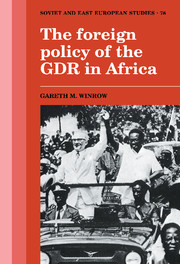Book contents
- Frontmatter
- Contents
- List of tables
- Preface
- Abbreviations
- 1 Introduction
- 2 The development of GDR relations with Africa in the pre-recognition period
- 3 The GDR in Africa in the 1970s
- 4 East German military/security involvement in Africa
- 5 East German economic relations with Africa
- 6 The GDR in Africa in the 1980s
- 7 Conclusion
- Notes
- Select bibliography
- Index
- Soviet and East European Studies
6 - The GDR in Africa in the 1980s
Published online by Cambridge University Press: 11 January 2010
- Frontmatter
- Contents
- List of tables
- Preface
- Abbreviations
- 1 Introduction
- 2 The development of GDR relations with Africa in the pre-recognition period
- 3 The GDR in Africa in the 1970s
- 4 East German military/security involvement in Africa
- 5 East German economic relations with Africa
- 6 The GDR in Africa in the 1980s
- 7 Conclusion
- Notes
- Select bibliography
- Index
- Soviet and East European Studies
Summary
Introduction
The East German authorities had hoped that following Honecker's African tours of 1979 a new era in GDR-African relations would commence. But the Soviet invasion of Afghanistan in December 1979 resulted in a sudden enhanced Third World suspicion of Soviet bloc activities in developing states. Here, the GDR was particularly unfortunate. East German admission to the UN Security Council in January 1980 coincided with the first UN General Assembly votes in which the overwhelming majority of Third World states condemned the invasion. Among African states in the UN only Ethiopia, Mozambique and Angola initially supported the Soviet invasion. In the Security Council the GDR and the USSR were isolated. In this particular instance, close association with the USSR was detrimental to the GDR's Afrikapolitik.
The invasion of Afghanistan also resulted in the demise of detente between the superpowers. Consequently, with the cost of an escalating arms race following the NATO decision to deploy cruise and Pershing missiles, and with the prospect of expensive military, political and economic support to shore up the new regime in Kabul, the USSR was reluctant to expand upon earlier commitments in Africa. However, the political and military support of socialist-oriented regimes and national liberation movements (particularly SWAPO and the ANC) in Africa was important, in order to reinforce the USSR's claim to global power status, to continue to adhere to the ideological imperative to work to change the international balance of forces in favour of socialism, to prevent a damaging loss of international prestige and credibility especially among Third World states, and to continue to offset Western influence in the region.
- Type
- Chapter
- Information
- The Foreign Policy of the GDR in Africa , pp. 187 - 216Publisher: Cambridge University PressPrint publication year: 1990



